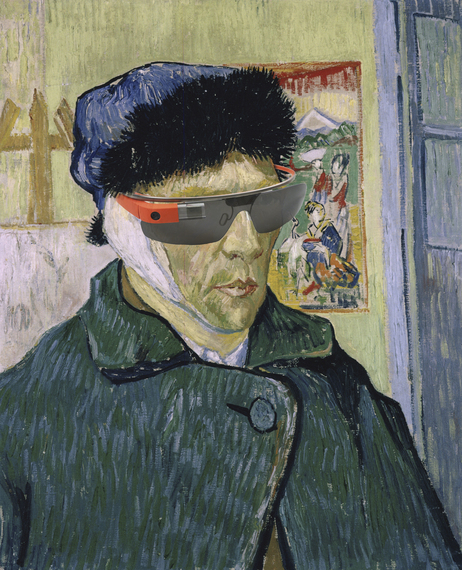I went on a trip to Paris last week where I noticed a number of tourists wearing various technological devices to take photos or track data on themselves. It's really awkward to stand in front of Van Gogh's Starry Night while the security guard tries to stop people from whispering to their Google Glass, "OK glass, take a picture!" If Vincent himself had been listening to this nonsense, I'm sure he would have tried to cut off the other ear. The most popular one though was a wearable device called the Fitbit. Fitbit tracks steps, distance and calories burned during the day, has an alarm if you've been sitting on the couch too long, tracks your sleep quality at night and then wakes you like an eager Richard Simmons in the morning. It does everything but play Eye of The Tiger and wipe the sweat from your brow while you jog up and down the stairs of the Sacre Coeur. Gone was the Parisian stereotype of couples making out on sidewalks while la Tour Eiffel sparkled in the distance. Instead, they ran in place at red lights admiring each other's North Face jackets while calculating the number of steps it took them to get to Versailles. Their conversations went something like this, "Oh look honey, we beat cousin Bobby and Mindy's trip to Versailles last month! On average, we walked 10 percent faster and burned 126 more calories!" Then they shared it on Facebook, next to Starry Night, tagged their athletically inferior friends, and captioned it "Winning!"
In the era of the Quantified Self, there is a new age philosophical question: If a man ascends the Eiffel Tower with no device to record how many steps were taken, were any calories actually burned? If there was nothing to quantify the exercise and no Facebook friends to share the data with, DID YOU EVEN GO TO PARIS? Probably not. Bill Gates and many others have argued that if you can't measure something, it doesn't exist. But is 'self knowledge' and 'improving' oneself really measurable by numbers?
Admittedly, it is difficult not to be dependent on certain types of technology. In Paris, I can't walk down the street without sucking faces with Google Maps. Like Mr. Magoo, I walk in front of cars, ignore red lights, and miss flower pots that fall from the sky because I am waiting for my device to tell me what to do next. I spin in circles on the sidewalk like Kristi Yamaguchi while I wait for Google to reroute me, tell me to get on the bus, or to get out my umbrella because it's about to rain. I'm so oblivious to my surroundings that the only way I know that I have arrived is when I smack my head into the door of my final destination. I can't imagine adding another self tracking device like Fitbit to tell me that all that spinning on sidewalks made my number of steps decrease by 7 percent from yesterday, that I would be 19 percent more efficient today if I hadn't gotten out of bed twice last night to pee and that regardless of what I do to 'improve' myself, I still have a 67 percent chance of getting breast cancer.
Feeling defeated by my Fitbit fantasy, I justified my failure to improve by convincing myself that real success should be determined by how FEW steps one needs to take. I imagined being escorted around Paris like Cleopatra, lying under a canopy carried by Nubians while they fed me grapes and yelled out the names of various monuments. I would strive to be as powerful as Justin Bieber, who demonstrated just last week that REAL winners have their bodyguards carry them up the Great Wall of China and to other fabulous destinations. Now THAT is efficiency! After all, aren't laziness and obesity the signs of great wealth? Fitbit would certainly be turned down by the likes of the Aga Khan who is given his weight in diamonds and gold every 10 years or by oil-rich Kuwaitis who I doubt are ready to give up their newfound fetish for the breasts of KFC despite a 75 percent obesity rate.
Once we become reliant on individualized data to become more efficient human beings (what could be more important?) will it become more difficult to know the value of the unquantifiable things in life? Imagine if Fitbit was really able to advise you on some of the most important steps in your life: walking down the aisle, Fitbit intervenes, "He's not the one!" Your child is about to take its first step and Fitbit says, "Hurry! Get the camera!" or if you finally motivate your drunken self to go to Alcoholics Anonymous, Fitbit cheers you on, "Come on, it's ONLY 12 steps, we've totally got this!" Or imagine we have to date in a world where we are all socially awkward data junkies who miss obvious social clues about whether or not physical contact is invited, where the basic "this isn't going so well" vibe is mistaken for "won't you please caress the side of my face now." Then, under the cloud of failed romance we retreat to our rejection-free homes to robot lovers and Internet porn. Will there be a future App to quantify how socially dysfunctional we are? I hope so.
